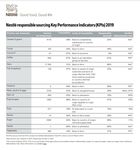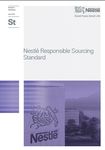Towards deforestation-free supply chains in Europe - Bart Vandewaetere VP Corporate Communications & Government Relations, Nestlé EMENA - Fern
←
→
Page content transcription
If your browser does not render page correctly, please read the page content below
Towards deforestation-free supply chains in Europe Bart Vandewaetere VP Corporate Communications & Government Relations, Nestlé EMENA
Our Responsible Sourcing Standard includes clear requirements for our
suppliers to protect forests, ecosystems & land rights
The raw materials we buy at origin level:
• Do not come from areas cleared of natural forest after December 31, 2015.
• Protect High Carbon Stock (HCS) land.
• Protect High Conservation Value (HCV) land and nearby territory (including
landscape-level ecosystems and peatlands)
Suppliers shall demonstrate:
• Evidence of Free, Prior and Informed Consent (FPIC) of local and indigenous
communities
• Legal right to use the land
These requirements are classified as Urgent and must be implemented within 6
https://www.nestle.com/sites/default/files/asset-
library/documents/library/documents/suppliers/nestle- months after being found as non-fulfilled.
responsible-sourcing-standard-english.pdf
2 19 March, 2021Achieving 100% deforestation-free supply chains requires a
combination of tools
We apply a holistic, ‘toolkit approach’ to assess, address and report on deforestation risks within our
supply chains
Supply Chain Certification Satellite On-the-ground Collaboration
Mapping monitoring verification
3 19 March, 2021Example: Ten years of progress in addressing sustainability issues in palm oil
2010 2020
• No traceability
Supply chain mapping Palm oil volumes we
beyond Tier 1
On-the-ground assessments source:
• No understanding of
In-depth assessments (e.g. Human Rights
the issues or root • 70% traceable to
Impact assessment)
causes of the issues Satellite monitoring for deforestation risks
plantation
• No collaboration or RSPO certification
• 96% traceable to mill
collective action on Worker voice • 70% deforestation free
the ground Industry collaboration
Note: we source from 88 direct suppliers, originating from more than 1,600 mills in 21
4 countries. Various Tiers between our Tier 1 supplier and plantationsSupply chain transparency = more trust and accountability
Progress reporting on our No Disclosure of Tier-1 suppliers and volumes List of suspended palm oil suppliers who
Deforestation commitment for 15 priority raw materials violated our RS Standard
Reporting on our responsible sourcing Progress reporting in our annual
definitions and KPIs Creating Shared Value report
5 19 March, 2021Key considerations for upcoming EU legislation
1. EU-wide mandatory due diligence complemented by other measures: partnerships with producing
countries, dialogue with other consumer countries, sustainable finance & investment
2. Alignment of key definitions with existing guidance and definitions like the Accountability Framework
initiative / High Carbon Stock Approach, covering forests, ecosystems and legal rights to use land
3. Apply a bulk commodity approach rather than a bulk product approach
4. Promote the principle of continuous improvement to get all actors engaged at landscape level but also
set a clear timeline that obligates all actors to:
a) fix commitments to 100% deforestation-free
b) implement a process to identify, act and report on deforestation risks as a “license to operate” on
the EU market
5. Include enforcement provisions that incentivize businesses to be fully transparent and collaborate on
the ground to end deforestation. Businesses should only be held liable for their own actions.
6 19 March, 2021You can also read



























































